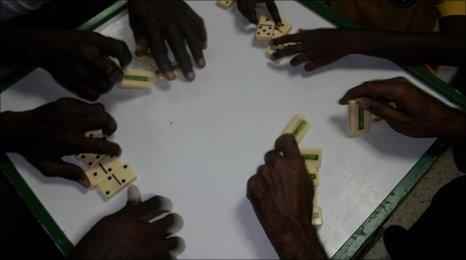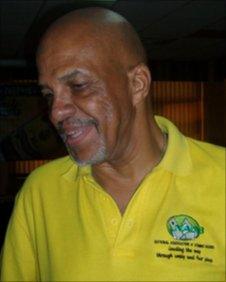Jamaica's dream of Olympic dominoes
- Published

In recent years Jamaica has become a superpower in sprinting - it boasts the world's fastest man and woman in Olympic Champions Usain Bolt and Shelly-Ann Fraser - but the nation wants to make a much slower game its new national sport.
Athletics, cricket and football are all extremely popular but dominoes is the one that nearly everyone knows how to play. It may be a quiet pastime in many countries but in Jamaica it is more than a game.
Underneath the shade of a tree, taxi drivers wait in a shop that doubles as a restaurant. The sound of the World Cup highlights are drowned out by the sound of plastic slamming against wood.
Every time a tile is played the table shakes. They have to be built sturdily for Caribbean-style dominoes, with its spirited gestures and colourful victory celebrations that match anything that can be seen on the screen from South Africa.
Domino competitions see players setting up from daybreak and going through until the early hours playing Cut Throat and Partner, the names of the two most popular local styles played.
A "Q", or quarter-litre bottle of white rum, is often a key element of the event, making the job of getting the game more professional even more of an uphill battle.
"I'd say seven of 10 of us play," says Rey Smith, head of the National Association of Domino Bodies in Jamaica.
"We play it as a social game and we're now playing it competitive level. It's that level that we're talking about with the Olympics."
Passion and flair
Getting national recognition is the first stage towards getting the International Olympic Committee (IOC) to make the sport eligible for the Games.

Rey Smith is head of Jamaica's National Association of Domino Bodies
It is already being accepted as a national sport around the globe from Azerbaijan to Barbados, the US to Russia. Jamaicans are hoping the same thing here will make them Olympians.
"Dominoes promotes team spirit and forces you to think and to strategise," says Olivia "Babsy" Grange, the sports minister.
"Those who engage in dominoes take it very seriously, we really have the knack, the skills, the foresight and the flair for playing dominoes and, because we have the passion, I know that we will dominate."
But the path to taking the game to the Olympics is likely to be a long process.
Lucas Guittard, president of the Federation of International Dominoes (Fid), points out that the game must first win recognition as a sport.
After that, he says, all countries playing the game should be brought under the Fid's umbrella.
For dominoes to join the Olympics, it must be approved by the IOC seven years before the edition of the Games where it will first feature.
As part of the recognition process, the Fid must prove it conforms with the Olympic Charter and follows the World Anti-Doping code.
The status of Olympic sport is still a long way off but Jamaica is hoping that by playing host to the 10th World Domino Championships in 2012, it will be able to push the more professional side of the game.
Hundreds of players from around the globe will be in Montego Bay for the competition, a chance to demonstrate that it is a sport.
"In every nook and cranny" is the slogan for dominoes on the island but for now Jamaica will have to look to more traditional sports for Olympic success.